Related Research Articles

Akinwande Oluwole Babatunde "Wole" Soyinka is a Nigerian playwright, novelist, poet, and essayist in the English language. He was awarded the 1986 Nobel Prize in Literature for his "wide cultural perspective and... poetic overtones fashioning the drama of existence", the first sub-Saharan African to win the Prize in literature.
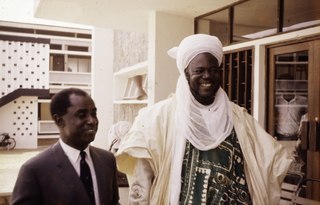
The Ibadan school of history was the first, and for many years the dominant, intellectual tradition in the study of the history of Nigeria. It originated at the University of Ibadan, in Ibadan, Nigeria, in the 1950s, and remained dominant until the 1970s. The University of Ibadan was the first university to open in Nigeria, and its scholars set up the history departments at most of Nigeria's other universities, spreading the Ibadan historiography. Its scholars also wrote the textbooks that were used at all levels of the Nigerian education system for many years. The school's output is often considered to be most clearly embodied in the "Ibadan History Series".
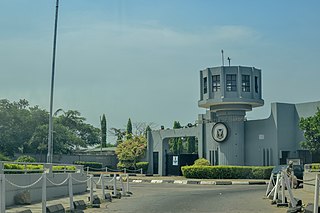
The University of Ibadan (UI) is a public research university in Ibadan, Nigeria. The university was once a college of the University of London. The college was established in 1948 as University College Ibadan, one of many colleges within the University of London. It became an independent university in 1962 and is the oldest degree-awarding institution in Nigeria. Through its graduate network, the University of Ibadan has contributed to the political, industrial, economic and cultural development of Nigeria.
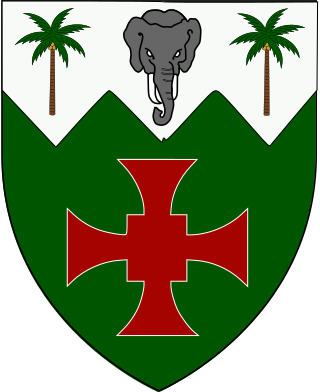
Fourah Bay College is a public university in the neighbourhood of Mount Aureol in Freetown, Sierra Leone. Founded on 18 February 1827, it is the first western-style university built in Sub-Saharan Africa and, furthermore, the first university-level institution in Africa. It is a constituent college of the University of Sierra Leone (USL) and was formerly affiliated with Durham University (1876–1967).

Catherine Obianuju Acholonu was a Nigerian author, researcher and political activist. She served as the Senior Special Adviser (SSA) to President Olusegun Obasanjo on Arts and Culture and was a founder-member of the Association of Nigerian Authors (ANA).

Kenneth Onwuka Dike was a Nigerian educationist, historian and the first Nigerian Vice-Chancellor of the nation's premier college, the University of Ibadan.
Jacob Festus Adeniyi Ajayi, commonly known as J. F. Ade Ajayi, was a Nigerian historian and a member of the Ibadan school, a group of scholars interested in introducing African perspectives to African history and focusing on the internal historical forces that shaped African lives. Ade Ajayi favours the use of historical continuity more often than focusing on events only as powerful agents of change that can move the basic foundations of cultures and mould them into new ones. Instead, he sees many critical events in African life, sometimes as weathering episodes which still leave some parts of the core of Africans intact. He also employs a less passionate style in his works, especially in his early writings, using subtle criticism of controversial issues of the times.
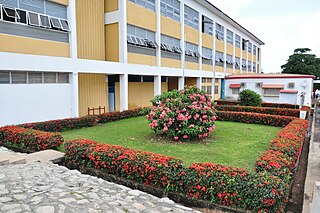
The International School Ibadan (ISI) is located on the Campus of the University of Ibadan, Nigeria's oldest university.
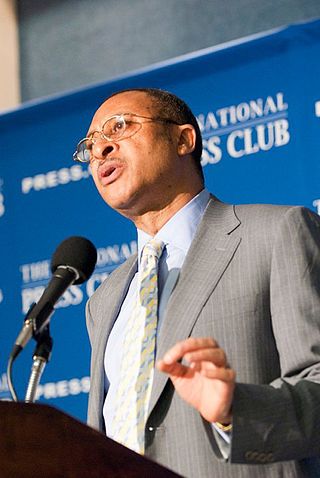
Patrick Okedinachi Utomi is a Nigerian professor of political economy and management expert. He is a Fellow of the Institute of Management Consultants of Nigeria and a former presidential candidate. He is the founder of Centre for Value in Leadership (CVL) and the political party, the African Democratic Congress. He is a professor at Lagos Business School, and has served in senior positions in government, as an adviser to the president of Nigeria, the private sector, as Chief Operating Officer at Volkswagen Nigeria.
The Nigeria Society of Physiotherapy (NSP) is the national professional association representing Nigerian-trained physiotherapists as well as foreign-trained physiotherapists practicing in Nigeria. The society was inaugurated on 29 August 1959 at a meeting held the Physiotherapy Department of the University College Hospital, Ibadan by a group of Nigerian and British Physiotherapists.

Toyin Omoyeni Falola is a Nigerian historian and professor of African Studies. Falola is a Fellow of the Historical Society of Nigeria and of the Nigerian Academy of Letters, and has served as the president of the African Studies Association. He is currently the Jacob and Frances Sanger Mossiker Chair in the Humanities at the University of Texas at Austin.

The National Archives of Nigeria has its headquarters in Abuja, Nigeria, with branches in Enugu, Ibadan, and Kaduna.The national archives kaduna is located at yakubu gowon way sabo Gari Nasarawa 802125 Kaduna. As of 2017, the current Director of Archives is Mr. Danjuma Dambring Fer.
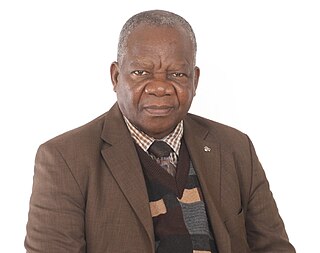
Michael Abiola Omolewa is a Nigerian diplomat, scholar, education historian, and civil servant. From September 2003 to October 2005, he served as the 32nd president of the General Conference of the United Nations Educational, Scientific and Cultural Organization (UNESCO). While president, Omolewa led UNESCO to adopt the International Declaration on Human Genetic Data and the Convention for the Safeguarding of Intangible Cultural Heritage. From January 2000 to August 2009, Omolewa served as permanent delegate and ambassador of Nigeria to UNESCO. At University of Lagos, on Wednesday 6 February 2019, Omolewa delivered the 5th Enoch Adeboye Annual Birthday Public Lecture; titled: Peace: The Global Quest.
The following is a timeline of the history of the city of Ibadan, Oyo State, Nigeria.

Abel Idowu OlayinkaFAS is a Nigerian professor of applied geophysics. He is a former deputy vice chancellor and former vice chancellor of the University of Ibadan. He is also the president of the West African Research and Innovation Management Association.

Grace Oladunni Taylor is a biochemist, formerly at University of Ibadan, Nigeria. She was the second woman to be inducted into the Nigerian Academy of Science and the first African awarded a L'Oréal-UNESCO Award for Women in Science.
Philip Aigbona Igbafe was a Nigerian historian, professor and public administrator noted for his work on the history of the Edo people of the precolonial Kingdom of Benin. He belonged to the Ibadan History School and his major works examine the motives for colonialism and highlight the political, social and economic consequences of British rule for the African kingdom.
Olajompo Abayomi Akinyeye is a Nigerian professor of history at University of Lagos, Nigeria. His research and teaching interests are in the areas of military history, strategic studies, international relations and diplomacy, comparative foreign policy, and regional integration. He is a widely published author, with several monographs, and dozens of scholarly articles appearing in various edited volumes and high-impact academic journals.
Tajudeen Gbadebo Olusanya Gbadamosi is a Nigerian historian and retired academic, who was a professor of history at the University of Lagos, Nigeria. His areas of research interests included African history, Nigerian history, Yoruba history, and the history of Islam in Africa with a particular emphasis on Nigeria.

Kenneth Dike Library was founded in 1948 as part of the University of Ibadan academic community. It has over two million academic materials such as books, theses and journals.
References
- 1 2 A. O. Adeoye (1992). "Understanding the Crisis in Modern Nigerian Historiography". History in Africa . 19: 1–11. doi:10.2307/3171993. JSTOR 3171993. S2CID 144696862.
- 1 2 "Second Annual Congress of the Historical Society of Nigeria". Africa . 28 (3): 277–278. 1958. doi:10.1017/S0001972000039954.
- ↑ C. B. N. Ogbogbo (2015). "Historical Society of Nigeria: The study of history and the Nigerian nation address by the president of the Historical Society of Nigeria". Journal of the Historical Society of Nigeria. 24: 1–13. JSTOR 24768926.
- ↑ Richard Reid (2015). "States of Anxiety: History and Nation in Modern Africa". Past & Present . 229 (1): 239–269. doi:10.1093/pastj/gtv033.